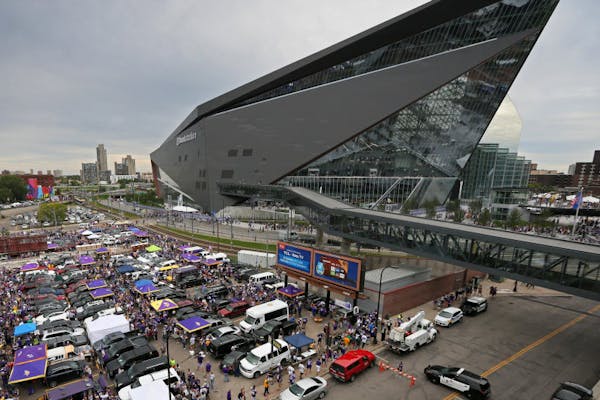You can't say Chuck Turchick didn't warn them.
In November 2013, Turchick stood before the Minnesota Sports Facilities Authority to express his concerns about the process of building the new Vikings football stadium. He had just read through the authority's use agreement with the team, and something stood out: the two suites that board members would soon be controlling.
Turchick is one of those civic-minded people who like to comb through documents, attend police review boards and write letters to the editor on important municipal issues. He was among those who fought against a publicly funded stadium.
Turchick thanked board members for allowing him to speak (again), then offered his thoughts on the two suites reserved for the board. "I couldn't find anything mentioned about that in the stadium legislation," he said. "I looked in the section describing compensation for members of the authority, and it wasn't there."
Turchick guessed the suites were worth about $100,000 per year (actually it's $200,000 to $300,000), which meant each member controlled a significant amount of assets. He gave members a couple of suggestions on how to handle the seats.
One was to make public the name of every person invited to the suites for a stadium event, whether or not he or she actually attended. He also asked that the authority reveal any business connections between members and invitees going back 10 years and to state the public purpose served by giving those invitees free seats.
"If you're at all concerned about the appearance of a conflict of interest or the appearance of corruption ... I think this is a very conservative proposal," Turchick said.
Members of the Minnesota Sports Facilities Authority, or MSFA, ignored him.
After all, Turchick is not one of the capital P — "Persons" identified in the use agreement — and never will be. He's just a normal guy who thinks government should be transparent.
"Thank you very much," Turchick concluded, "and thank you for allowing me to tilt at windmills."
So here we are. A modern-day Don Quixote tilted, officials ignored him, and we have an investigation by the state auditor about whether behavior by the MSFA appears to be a conflict of interest or corrupt.
I asked Turchick this week if he wished that board members had listened.
"Of course I do," he said. "I didn't have any illusion they'd listen to us, though. It's just accepted as a perk."
This all started when a Star Tribune reporter asked for the names of people who have watched Vikings games from the MSFA suites, and had her request rejected. MSFA Chairwoman Michele Kelm-Helgen said guests there to check out the stadium for an event don't want to see their names in the newspaper. Funny. Organizations looking to pit cities against each other for their business usually publicize their visits to increase competition.
The MSFA eventually released the names of several prominent DFLers treated to seats, and those invitees coughed up $200 apiece for the experience. Kelm-Helgen said MSFA officials brought their families to the games because authority members worked so hard.
Suffice it to say, readers were not impressed. Comments, calls and e-mails were almost unanimous in their opinions: At the very least, this looks really bad. The public should know who is schmoozing with elected officials in very expensive seats in a stadium we paid a half-billion dollars for.
Reserved board seats are nothing new. However, many were critical of the scale of the perk — 36 seats spread among board members.
Mark Oyaas can remember attending Vikings games at the Metrodome as a guest of a board member of the Metropolitan Sports Facilities Commission, an earlier version of the sports authority. Oyaas, a finance and communications consultant, said he served as a "one-man focus group," offering opinions on such things as concessions.
Oyaas recalls entering the stadium and signing his name on a sheet of paper as a guest and said the list was kept in case the public, or a reporter, wanted to examine it. He admits the procedure might have "slipped" over the years.
Yet, Oyaas understands why this issue got so hot.
"It's flipped a switch with people," he said. "You never say, 'We can't tell you who is here,' or that, 'We bring our family because we work too hard.' "
In a letter he copied to me and to Jim Nobles, the state auditor, Turchick explained his problem with the current control of seats, and he did some long division, calculating that the face value of the seats could be between $1,100 and $1,600. He said if those tickets were given to board members, they should pay taxes on them.
"Wow, you nailed it," Nobles wrote back.
Expect Turchick to be at the MSFA meeting in December, with more suggestions.
jtevlin@startribune.com • 612-673-1702
Follow Jon on Twitter: @jontevlin

Tevlin: 'Against all odds, I survived a career in journalism'

Tevlin: Grateful Frogtown couple fight their way back from fire and illness




